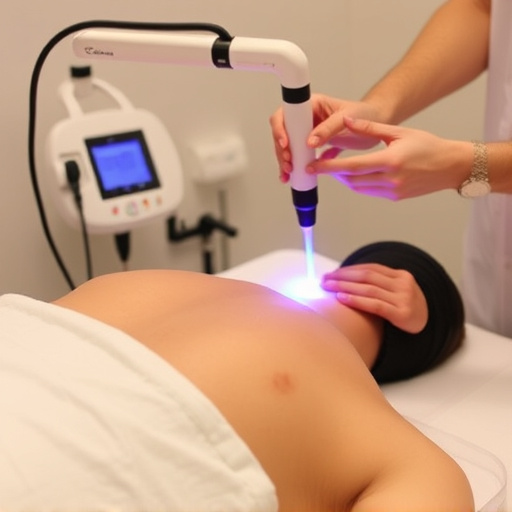AI transforms comprehensive skin analysis, enhancing precision and efficiency in dermatological assessments. AI algorithms analyze skin images to detect subtle variations in texture, pigmentation, and structure, aiding in accurate diagnoses from common issues to rare conditions. This technology streamlines analysis, freeing dermatologists for patient interaction, leading to faster, personalized care tailored to unique skin health needs. Future of dermatology includes AI-driven systems processing vast data for expert advice, democratizing access to effective skincare solutions.
In the realm of dermatology, a comprehensive skin analysis is a game-changer. With advancements in technology, modern systems are transforming how we assess skin health. This article delves into the role of Artificial Intelligence (AI) in enhancing these analyses, offering unprecedented precision and efficiency. We explore AI integration, its benefits, and future implications, aiming to revolutionize dermatological care through innovative comprehensive skin analysis techniques. Understanding this process is key to unlocking better patient outcomes.
- Understanding Comprehensive Skin Analysis: A Modern Approach
- AI Integration: Enhancing Precision and Efficiency
- Future Implications: Revolutionizing Dermatological Care
Understanding Comprehensive Skin Analysis: A Modern Approach

Comprehensive skin analysis has evolved into a modern approach, leveraging advanced technologies to offer a deeper understanding of skin health. Unlike traditional methods, this innovative process goes beyond surface-level inspection, delving into the intricate details and complex interactions within the skin. By integrating artificial intelligence (AI), medical spa services have transformed, enabling more accurate diagnoses and personalized treatment plans.
AI-powered systems can analyze various factors such as skin texture, tone, and elasticity, even identifying subtle changes that may indicate underlying conditions or the early signs of aging. This level of precision is particularly beneficial for procedures like microneedling therapy and anti-aging treatments, where targeted and effective interventions are key. With AI guiding these medical spa services, professionals can tailor their approach to each client’s unique needs, ensuring optimal results.
AI Integration: Enhancing Precision and Efficiency

The integration of Artificial Intelligence (AI) has revolutionized comprehensive skin analysis systems, significantly enhancing precision and efficiency in dermatological assessments. AI algorithms can process vast amounts of data from various imaging techniques, such as high-resolution photographs and dermoscopes, to detect even the subtlest variations in skin texture, pigmentation, and structure. By learning from extensive datasets, these algorithms can accurately identify skin conditions, including common issues like acne, eczema, and psoriasis, as well as more rare tumors or lesions. This advanced capability not only aids in early detection but also reduces the likelihood of misdiagnosis, a critical aspect in effective skincare management.
Moreover, AI integration streamlines the analysis process, enabling automated feature extraction and pattern recognition, which were once time-consuming manual tasks. This efficiency allows dermatologists to focus more on patient interaction, treatment planning, and monitoring progress with non-surgical treatments, such as customized facials and topical therapies. As a result, patients benefit from faster, more personalized care that considers their unique skin health needs, ultimately fostering better outcomes and enhanced patient satisfaction.
Future Implications: Revolutionizing Dermatological Care

The future of dermatological care is poised for a significant transformation with the integration of AI into comprehensive skin analysis systems. These advanced technologies are set to revolutionize the way skin conditions are diagnosed and treated, potentially improving patient outcomes and enhancing overall healthcare efficiency. By analyzing vast amounts of data and complex patterns within skin images, AI algorithms can provide dermatologists with valuable insights, assisting in more precise diagnoses and personalized treatment plans.
This shift towards AI-driven dermatology offers promising implications for various aspects of skincare. From identifying subtle changes in skin texture related to body contouring procedures to suggesting tailored aesthetic treatments and recommending effective hydrating facials based on individual needs, these systems can democratize access to expert advice. As a result, individuals can expect more accessible, efficient, and tailored skincare solutions, ultimately fostering better skin health and enhanced self-confidence.
Comprehensive skin analysis systems, powered by AI integration, represent a significant leap forward in dermatological care. By enhancing precision and efficiency, these advanced technologies are set to revolutionize the way skin conditions are diagnosed and managed. As AI continues to evolve, its role in improving patient outcomes and streamlining clinical workflows will become increasingly indispensable, promising a future where comprehensive skin analysis is accessible, accurate, and transformative for all.














